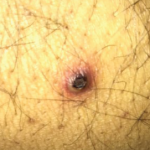Additionally, patients with IBD are frequently treated with thiopurine drugs, such as 6-mercatopurine, in combination with anti-TNF or anti-TNF monotherapy. Although thiopurines did increase the risk of NMSC recurrence in patients with IBD relative to anti-TNF monotherapy, the risk increase was not statistically significant. The authors concluded their paper by suggesting that further long-term studies be performed in patients with IBD to determine whether or not thiopurines and/or anti-TNF increase the risk of NMSC recurrence.
Lara C. Pullen, PhD, is a medical writer based in the Chicago area.
ad goes here:advert-1
ADVERTISEMENT
SCROLL TO CONTINUE
References
- Scott FI, Mamtani R, Brensinger CM, et al. Risk of nonmelanoma skin cancer associated with the use of immunosuppressant and biologic agents in patients with a history of autoimmune disease and nonmelanoma skin cancer. JAMA Dermatol. 2015 Oct 28:e1–e9. doi: 10.1001/jamadermatol.2015.3029. [Epub ahead of print]

